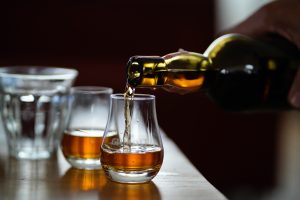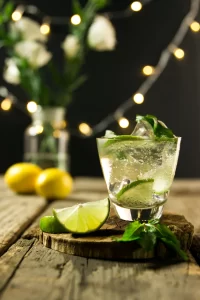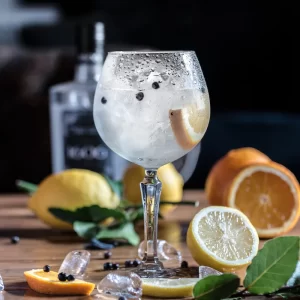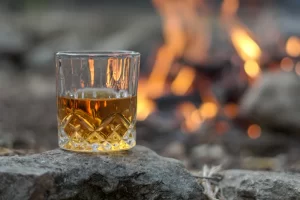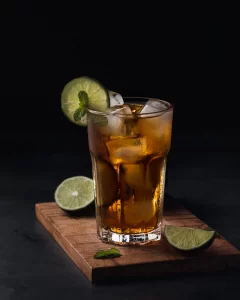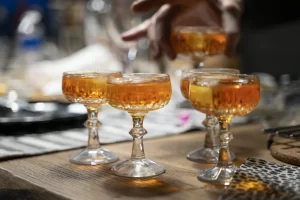Distillers Association Of North Carolina
North Carolina has a complicated and interesting history with distilling but is now experiencing a revival of spirit distillers. The Distillers Association of North Carolina is an important part of that.
We take a look at what the association is, its membership, the history of distilling in the state as well as the legality and restrictions of distilling.
What Is The Distillers Association Of North Carolina?
The Distillers Association of North Carolina is a mutually beneficial association which is operated to promote the business interests of the North Carolina distilling industry.
It has 37 active distillery members and 22 government or associate members. The association was established to provide support and regulatory help to the distillers of North Carolina. A distiller’s license fee in North Carolina costs $300.
To operate a distillery in North Carolina it is necessary to have a commercial activity permit which is issued by the NC Department of Public Safety. There are 19 such permits depending on the type of distilling activity.
Members Of The Distillers Association Of North Carolina
The following Distillers are the members of the Distillers Association Of North Carolina:
- Broadslab Distillery in Benson, North Carolina
- Mystic Farm and Distillery in Durham, North Carolina
- Next Century Spirits in Raleigh, North Carolina
- Call Family Distillers in Wilkesboro, North Carolina
- Biltmore Estate Wine Company in Asheville, North Carolina
- Durham Distillery in Durham, North Carolina
- Cedar Mountain Moonshine in Cedar Mountain, North Carolina
- Cultivated Cocktails in Asheville, North Carolina
- Bogue Sound Distillery, Inc. in Bogue, North Carolina
- Cape Fear Winery and Distillery in Elizabethtown, North Carolina
- Brad Halling American Whiskey Company in Southern Pines, North Carolina
- Doodle Sasser Distilling in Matthews, North Carolina
- Fair Game Beverage Company in Pittsboro, North Caroina
- Lonerider Spirits in Wake Forest, North Carolina
- GIA Distillery in Madison, North Carolina
- Liberty & Plenty Distillery in Durham, North Carolina
- Eda Rhyne Distilling Company in Asheville, North Carolina
- Southern Distilling Company in Statesville, North Carolina
- End of Days Distillery in Wilmington, North Carolina
- Loping Crow Distillery in Albemarle, North Carolina
- Southern Pines Spirits in Southern Pines, North Carolina
- Fully Vetted Distillery
- Steel Cask Distilling in Moorseville, North Carolina
- Mother Earth Spirits in Kinston, North Carolina
- Two Trees Distilling Company in Fletcher, North Carolina
- Oak & Grist Distilling Company in Black Mountain, North Carolina
- Crux Distillery in Maple Hill, North Carolina
- Oaklore Distilling Company in Matthews, North Carolina
- Great Wagon Road Distilling Company in Charlotte, North Carolina
- Old Nick Williams Company in Lewisville, North Carolina
- Walton’s Distillery in Jacksonville, North Carolina
- Warehouse Distillery in Newton, North Carolina
- South Mountain Distilling Company in Connelly Springs, North Carolina
- Outer Banks Distilling in Manteo, North Carolina
- Southern Grace Distilleries in Mount Pleasant, North Carolina
- Weldon Mills Distillery in Weldon, North Carolina
- Sutler’s Spirit Company in Winston-Salem, North Carolina
The Associate and Government Members are as follows:
- Grandstand Glassware + Apparel
- American Craft Spirits Association
- Berlin Packaging
- Arryved
- Beer Law Center
- North Carolina Association of ABC Boards
- All American Containers
- PIC Publications
- Big Sip Craft Beverage Festival
- Distillery Protection by Faw Insurance
- AnyRoad
- Wright Global Graphics
- Dorado Rock
- North Carolina Craft Brewers Guild
- Iron Heart Canning
- North Carolina Alcoholic Beverage Control Commission
- North Carolina Department of Agriculture
- Tapi USA
- Saverglass
- Xtreme! Marketing
- Saxco
- WV Great Barrel Company
History Of Distilling In North Carolina
Craft distilling has experienced a revival in recent years following the resurgence of craft beers, wine and coffee. At one time the state had more distilleries than anyone else, but it went into prohibition early and came out late.
Distilling didn’t become legal again until 1979, and it wasn’t until 2005 that the state got its first distillery. However, that was not the end of the story.
After prohibition was repealed each state was allowed to develop their own alcohol systems, but North Carolina was different. It developed local ABC (Alcoholic Beverage Control) stores for the sale of liquor with the profits put back into the community.
North Carolina still uses this system. There are 422 ABC stores as well as 133 ABC boards who either own or lease the stores in the state. This means that each distiller has to market their products to these stores in addition to manufacturing it.
Legal Manufacturing Of Distilled Spirits

When you have a distillery permit you are allowed to manufacture, possess, purchase, import and transport the equipment and ingredients used for distilling spirits.
You can also sell, ship, and deliver spirits wholesale in closed containers to local boards in the state or exporters. It is permitted to sell retail or wholesale to public or private agencies subject to the laws of other jurisdictions in other states and nations.
Also with a permit you may transport the maximum amount of liquor allowed under law into or out of the distillery as long as it is related to the process of distilling.
Licenses Required For Manufacturing Spirits
In order to legally manufacture spirituous liquor you need several different licenses. A basic permit allows the holder to produce spirits, but it is also necessary to have a license for distilling equipment or distillery.
The restrictions pertaining to manufacturing spirits include the offense of owning or selling any equipment or ingredients with the intent to manufacture any alcoholic beverage. Although it is permitted to make beer or wine and no permit is required for this.
Selling Distilled Spirits At A Distillery
Up until 2019 it was not possible for distilleries to sell bottles directly from the distillery, instead it had to sell its produce through ABC boards and stores. But when SB290 was signed into law that all changed.
Distilleries could now sell unlimited bottles of their own products on their premises for consumption off premises. Up to that point a distillery customer could only purchase five bottles per year directly from the distillery.
It was also necessary for customers to take a tour of the distillery prior to purchasing bottles of spirits and this necessity was now removed. Previously the sales data of each customer was recorded, and special tour stickers were applied to any bottles of spirits sold.
These restrictions were also removed with the introduction of SB290.
Final Thoughts
We hope that you have enjoyed this guide to the Distillers Association of North Carolina and that it has been interesting and informative for you.
Frequently Asked Questions
Is Home Distilling Illegal In North Carolina?
It is illegal to distill moonshine without a distilling permit in North Carolina. However it is possible to own a still for the purpose of distilling water or making essential oils provided ethanol is not a byproduct of the process.
What Liquor Is North Carolina Known For?
Distilleries and micro-distilleries in North Carolina produce small batch gin, whiskey, rum, vodka, applejack and moonshine, a colorless whiskey.
How Many Distilleries Are In North Carolina?
There are more than 80 locally owned and operated distilleries in North Carolina making a range of spirits including gin, rum and whiskey.
